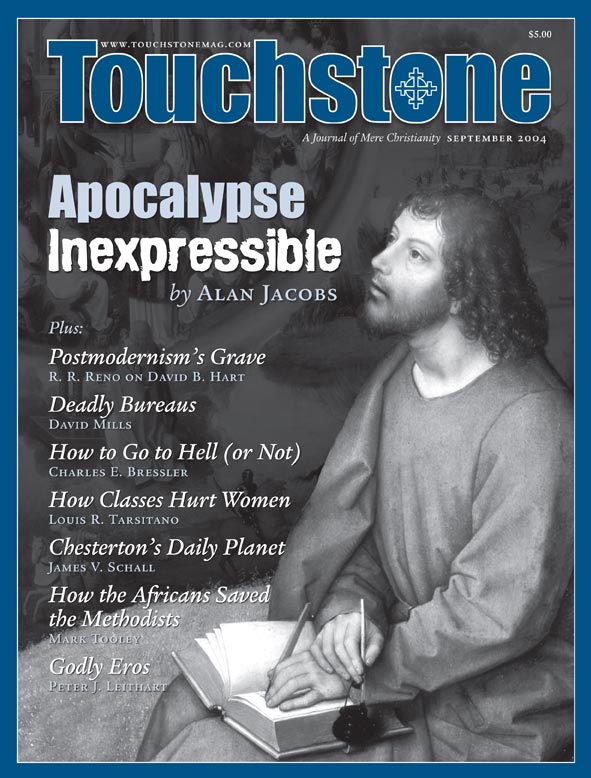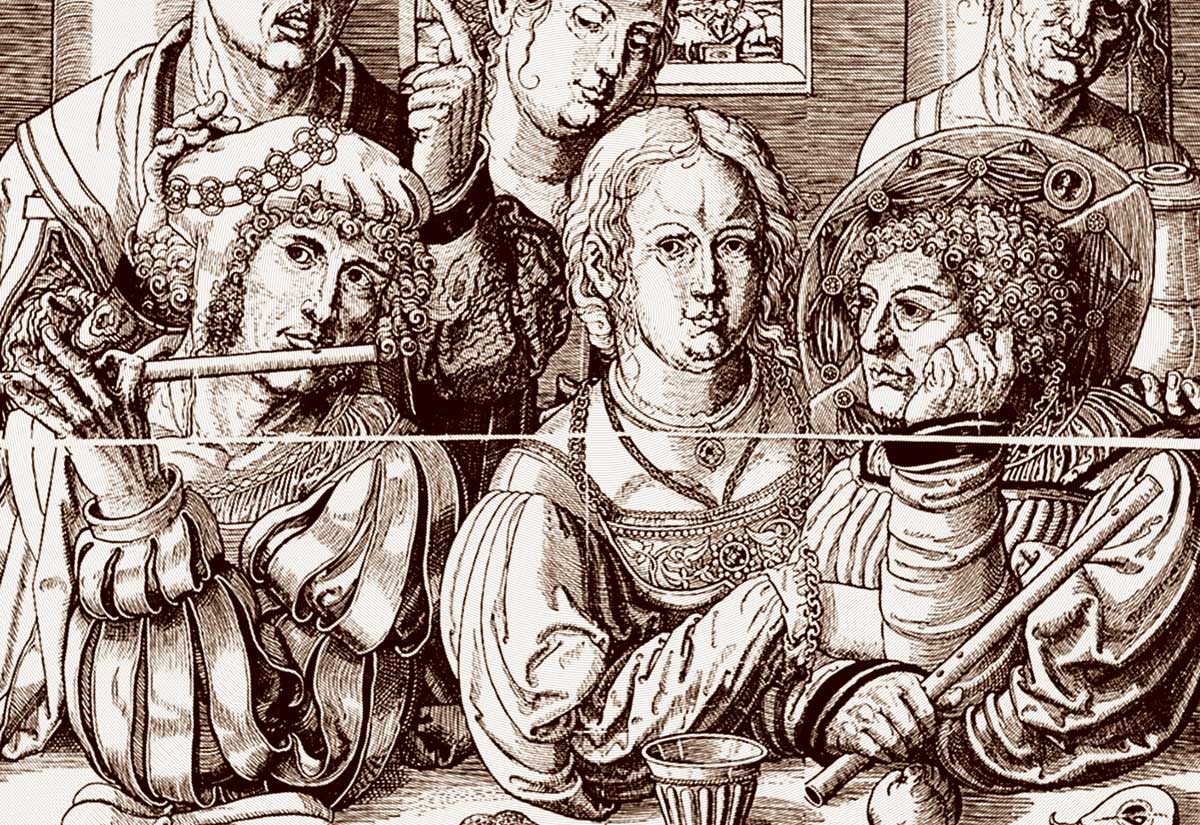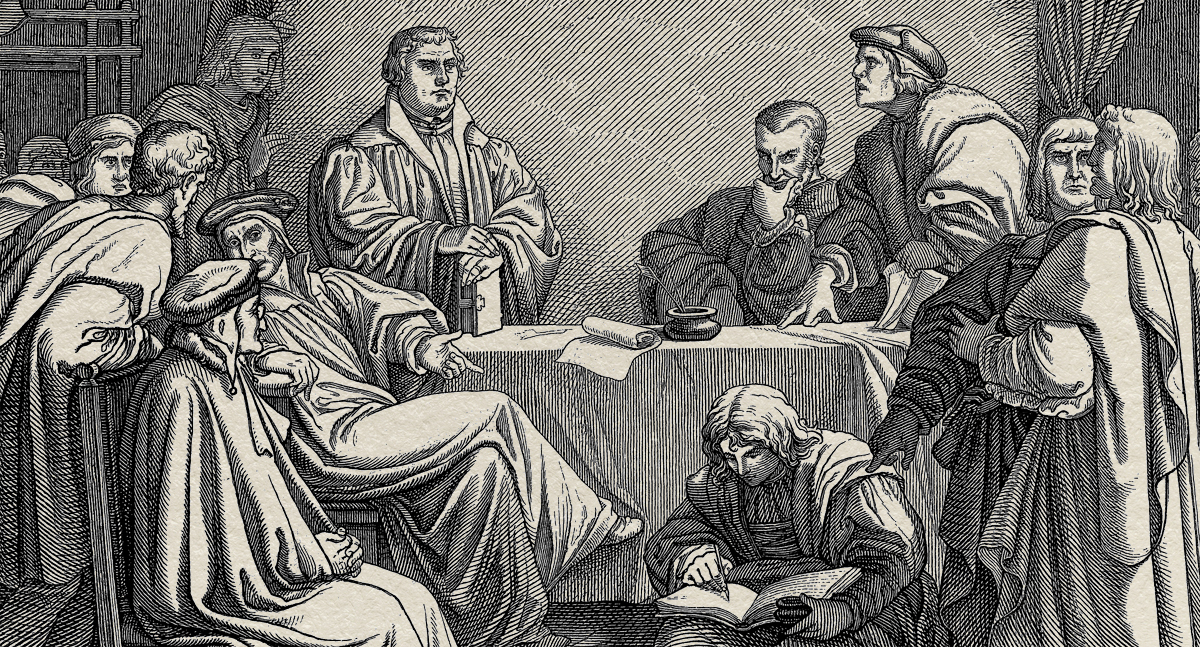View
Godly Eros
Peter J. Leithart on Christian Love in Marriage
“Erotic” films are housed in a separated, smarmy section of the video store; “erotic” web sites are, purportedly, off-limits to everyone under 18; and any decent parent has to shield his child’s eyes when they pass the “erotic” novels section at Borders. In today’s usage, “erotic” is virtually equivalent to “pornographic.”
This is a tragedy. If Christians are going to grasp the truth about sex and marriage, and effectively combat our culture’s profound sexual confusions, we must not abandon eroticism to the pimps and pornographers. We must instead become eroticism’s strongest advocates.
Let me explain. Greek has several words for love: Philia, which refers to friendship and brotherly affection; agape, often defined as self-giving, selfless love; and eros, often defined as self-love or self-seeking love. Eros and agape have often been sharply contrasted, as in these words from Alan Soble:
Eros is acquisitive, egocentric or even selfish; agape is a giving love. Eros is an unconstant, unfaithful love, while agape is unwavering and continues to give despite ingratitude. Eros is a love that responds to the merit or value of its object; while agape creates value in its object as a result of loving it. . . . [E]ros is an ascending love, the human’s route to God; agape is a descending love, God’s route to humans.

On this account, if I love with agapic love, I love without regard for any satisfaction or pleasure that might come to me: Agapic love is the love of the Good Samaritan for the victim on the road to Jericho, the love of the martyr for his persecutors, Jesus’ love for sinners. If I love with erotic love, I want to be loved in return, and I seek all the satisfactions and pleasures, often including sexual pleasures, that accompany requited love: Erotic love is the love of the courtly lover struck by the arrow of desire, the love of a thousand romantic films and novels, the love of the Platonic mystic who ascends from beautiful things to the contemplation of Beauty itself, the love that hopes to own what it loves.
Erotic love seeks possession; agapic love freely dispossesses. Erotic love is self-seeking; agapic love is pure love for the other. Erotic love often seeks physical satisfaction, and verges dangerously close to lust; agapic love is spiritual. In the minds of many Christians, Christian love aims to be thoroughly agapic.
Deep Tensions
Not surprisingly, this contrast of eros and agape creates deep tensions in the Christian understanding of marriage. On the one hand, Christ’s agapic love for the Church sets the pattern for a husband’s love for his bride; but on the other hand, marital love is irreducibly erotic. Isn’t marital love always self-seeking to some degree? Don’t husbands and wives quite naturally, and rightly, desire to be loved? Is marital love in the end doomed to be a corrupt or even perverse image of the true love of the Divine Bridegroom for his bride?
Some Christians address this dilemma by offering a more favorable assessment of eros. C. S. Lewis agreed that there is a “carnal” element in erotic love, but refused to accept that eros could be reduced to sexual desire, much less reduced to lust: “Very often what comes first is [not sexual desire but] simply a delighted pre-occupation with the Beloved—a general, unspecified pre-occupation with her in her totality,” he wrote in The Four Loves. “If you asked [a man under the influence of eros] what he wanted, the true reply would often be, ‘To go on thinking of her.’”
Lust is quite different: “We use a most unfortunate idiom,” Lewis wrote, “when we say, of a lustful man prowling in the streets, that he ‘wants a woman.’ Strictly speaking, a woman is just what he does not want. He wants a pleasure for which a woman happens to be a necessary piece of apparatus.” Eros, by contrast, “makes a man really want, not a woman, but one particular woman.”
In this view, eros responds to the good, true, and beautiful in the beloved, and that means that Christ’s prohibition of lust is not an attack on eros, but the opposite. It is a tragedy that “erotic” has come to be synonymous with “pornographic.” Christian condemnation of lust is, as John Paul II has argued, an appeal for a “true eroticism,” a desiring love that does not reduce the beloved to a sexual object but is attracted to the image of divine goodness and beauty in the person loved.
To this extent, Christians are called to express erotic love in the whole of their marriage. This eroticism, in fact, is at the heart of the wedding vows. The man and woman being married commit themselves to keeping themselves only for each other so long as they both shall live. This is not merely a pledge of sexual faithfulness, though of course it is that; the man has promised to be preoccupied, not with “a woman,” but with the particular woman he is marrying, and she has pledged to delight not in “a man” but in him.
In the wedding vows, the couple set out on the adventure of discovering and celebrating in each other the refulgence of God’s glory that is the image of God. They commit themselves to discover and celebrate that radiance in ever fresh ways “so long as you both shall live.” They are called, in short, to “true eroticism.”
The Gift of Love
Yet, a basic question remains. Erotic love seeks for satisfaction, and therefore appears to be self-interested. Yet, God can receive nothing and hopes to receive nothing from us, and yet he loves us. Eros seems completely absent from God’s love for his bride, so how can you manifest God’s love in your marriage?
The answer is simple: God does desire us, he longs for us, he considers us his lovely and spotless bride, he does look for a response. God’s love for us is erotic, for he takes interest in each of us and loves us in order to evoke love from us. God’s love includes his desire to be loved. We must feel the full weight of this truth. The Triune God is eternal, and he is eternally full of all joy, love, fellowship, feasting, and life. He needs nothing, and nothing that he makes can add even in the smallest degree to the satisfaction of the Triune fellowship.
And yet, this same God created a world and called it good; this same God assures us that he delights in his world and his people. Through the prophet Isaiah, Yahweh says that his exiled people will no longer be called “Forsaken,” but instead, “you will be called ‘My delight is in her’ and your land ‘Married.’ For as a young man marries a virgin, so your sons will marry you; and as the bridegroom rejoices over the bride, so your God will rejoice over you” (Is. 62:4–5). And again, “I create Jerusalem for rejoicing, and her people for gladness. I will also rejoice in Jerusalem, and be glad in my people” (Is. 65:18–19).
The prophet Zephaniah says of Jerusalem, “Yahweh your God . . . will exult over you with joy, he will be quiet in his love, he will rejoice over you with shouts of joy” (Zeph. 3:17). And Jesus himself says that the Father sent him because the Father out of love “seeks worshipers” who will worship in Spirit and in truth (John 4:23–24). That such a God would rejoice over us is, as Paul would say, a great mystery, but it is true.
What makes marital love a true image of divine love is not a renunciation of desire; what makes love truly love is the kind of desire it expresses and the kind of response it anticipates. True eros desires a particular kind of return, a return with difference. A true exchange of love is never an exchange of identical items.
If the woman gave the man the exact ring he gave her, the message would be: “The engagement is off.” As the Orthodox theologian David Hart says, “A gift that is exactly reciprocated is a gift that is returned, rejected . . . a violence, like a blow instantly returned.” To hope that you will receive exactly the same love you give is the crudest form of self-love. You might as well gaze longingly and affectionately into a mirror.
All givers give in hope of a return, but a return with difference; every lover hopes his beloved will reciprocate his love, but the wise lover knows that the reciprocated love will be as wonderfully different as the beloved herself. And the wise lover joyfully embraces that difference, even as he joyfully embraces his beloved.
A man is called to love, and it is right for him to want his wife to love him. But she is not called to give back exactly what he gives her. His wife is a woman, and will love him as a woman, which is not the way a man loves. If a man wants only what he can give, he might as well stay single and live with a bunch of guys the rest of his life or march off to live by a railroad track.
Likewise, when a woman gives herself in love to a husband, she hopes and wants him to give himself to her. But she should not expect him to give back exactly what she has given him, for he will love her as a man, and not just a man; he will love her as only he, a particular man, can.
Eternal Love
This means that both are called to express true eros. “True eroticism” is, Lewis says, a delighted preoccupation with each other, and it is a delighted preoccupation with the otherness of each other.
And in this, too, they are displaying the love of God, the eternal love of the Father, the Son, and the Spirit. For the Father pours out his love on the Son and the Spirit, and he desires the Son and the Spirit to love him in return. And they do, but to the Father’s joyous paternal love the Son returns something surprising and fresh; the Son returns filial love. To the love of the Father and the Son, the Spirit returns the love that only the Spirit can give. To the melody of the Father’s song, the Son and the Spirit respond not by repeating the melody, but with harmonious counter-themes.
As the married man and woman hope to receive love from each other, as they give and reciprocate with delighted surprise in their differences, they imitate the love of God, the eternal round of love that is both eros and agape, the eternal polyphony of love that is yet beyond both. •
Peter J. Leithart is an ordained minister in the Presbyterian Church in America and the president of Trinity House Institute for Biblical, Liturgical & Cultural Studies in Birmingham, Alabama. His many books include Defending Constantine (InterVarsity), Between Babel and Beast (Cascade), and, most recently, Gratitude: An Intellectual History (Baylor University Press). His weblog can be found at www.leithart.com. He is a contributing editor of Touchstone.
subscription options
Order
Print/Online Subscription

Get six issues (one year) of Touchstone PLUS full online access including pdf downloads for only $39.95. That's only $3.34 per month!
Order
Online Only
Subscription

Get a one-year full-access subscription to the Touchstone online archives for only $19.95. That's only $1.66 per month!
bulk subscriptions
Order Touchstone subscriptions in bulk and save $10 per sub! Each subscription includes 6 issues of Touchstone plus full online access to touchstonemag.com—including archives, videos, and pdf downloads of recent issues for only $29.95 each! Great for churches or study groups.
Transactions will be processed on a secure server.
more on marriage from the online archives
more from the online archives
calling all readers
Please Donate
"There are magazines worth reading but few worth saving . . . Touchstone is just such a magazine."
—Alice von Hildebrand
"Here we do not concede one square millimeter of territory to falsehood, folly, contemporary sentimentality, or fashion. We speak the truth, and let God be our judge. . . . Touchstone is the one committedly Christian conservative journal."
—Anthony Esolen, Touchstone senior editor














